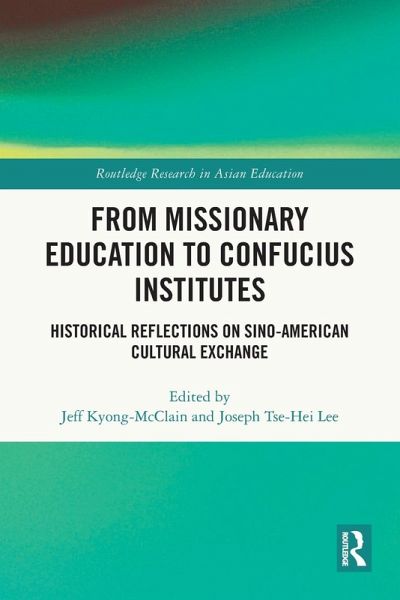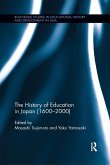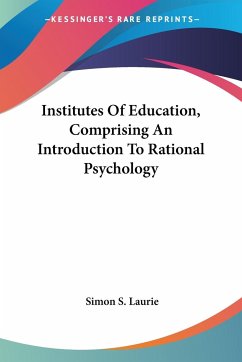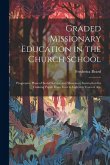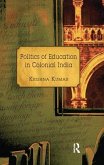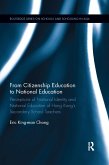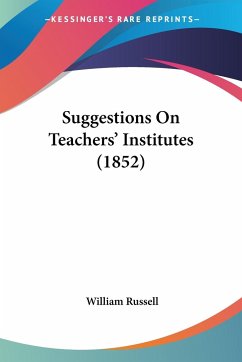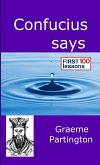From Missionary Education to Confucius Institutes
Historical Reflections on Sino-American Cultural Exchange
Herausgeber: Kyong-Mcclain, Jeff; Lee, Joseph Tse-Hei
From Missionary Education to Confucius Institutes
Historical Reflections on Sino-American Cultural Exchange
Herausgeber: Kyong-Mcclain, Jeff; Lee, Joseph Tse-Hei
- Broschiertes Buch
- Merkliste
- Auf die Merkliste
- Bewerten Bewerten
- Teilen
- Produkt teilen
- Produkterinnerung
- Produkterinnerung
From Missionary Education to Confucius Institutes examines the history and globalization of cultural exchange between the US and China and corrects many myths surrounding the incompatibility of American and Chinese cultures in the higher educational sphere.
Andere Kunden interessierten sich auch für
![The History of Education in Japan (1600 - 2000) The History of Education in Japan (1600 - 2000)]() The History of Education in Japan (1600 - 2000)66,99 €
The History of Education in Japan (1600 - 2000)66,99 €![Institutes Of Education, Comprising An Introduction To Rational Psychology Institutes Of Education, Comprising An Introduction To Rational Psychology]() Simon S. LaurieInstitutes Of Education, Comprising An Introduction To Rational Psychology23,99 €
Simon S. LaurieInstitutes Of Education, Comprising An Introduction To Rational Psychology23,99 €![Graded Missionary Education in the Church School; Progressive Plans of Social Service and Missionary Instruction for Training Pupils From Four to Eigh Graded Missionary Education in the Church School; Progressive Plans of Social Service and Missionary Instruction for Training Pupils From Four to Eigh]() Frederica BeardGraded Missionary Education in the Church School; Progressive Plans of Social Service and Missionary Instruction for Training Pupils From Four to Eigh20,99 €
Frederica BeardGraded Missionary Education in the Church School; Progressive Plans of Social Service and Missionary Instruction for Training Pupils From Four to Eigh20,99 €![Politics of Education in Colonial India Politics of Education in Colonial India]() Krishna KumarPolitics of Education in Colonial India71,99 €
Krishna KumarPolitics of Education in Colonial India71,99 €![From Citizenship Education to National Education From Citizenship Education to National Education]() King Man Eric ChongFrom Citizenship Education to National Education69,99 €
King Man Eric ChongFrom Citizenship Education to National Education69,99 €![Suggestions On Teachers' Institutes (1852) Suggestions On Teachers' Institutes (1852)]() William RussellSuggestions On Teachers' Institutes (1852)22,99 €
William RussellSuggestions On Teachers' Institutes (1852)22,99 €![Confucius Says Confucius Says]() Graeme PartingtonConfucius Says20,99 €
Graeme PartingtonConfucius Says20,99 €-
-
-
From Missionary Education to Confucius Institutes examines the history and globalization of cultural exchange between the US and China and corrects many myths surrounding the incompatibility of American and Chinese cultures in the higher educational sphere.
Hinweis: Dieser Artikel kann nur an eine deutsche Lieferadresse ausgeliefert werden.
Hinweis: Dieser Artikel kann nur an eine deutsche Lieferadresse ausgeliefert werden.
Produktdetails
- Produktdetails
- Verlag: Taylor & Francis
- Seitenzahl: 244
- Erscheinungstermin: 30. Januar 2025
- Englisch
- Abmessung: 234mm x 156mm x 14mm
- Gewicht: 367g
- ISBN-13: 9781032497877
- ISBN-10: 1032497874
- Artikelnr.: 72541906
- Herstellerkennzeichnung
- Libri GmbH
- Europaallee 1
- 36244 Bad Hersfeld
- gpsr@libri.de
- Verlag: Taylor & Francis
- Seitenzahl: 244
- Erscheinungstermin: 30. Januar 2025
- Englisch
- Abmessung: 234mm x 156mm x 14mm
- Gewicht: 367g
- ISBN-13: 9781032497877
- ISBN-10: 1032497874
- Artikelnr.: 72541906
- Herstellerkennzeichnung
- Libri GmbH
- Europaallee 1
- 36244 Bad Hersfeld
- gpsr@libri.de
Jeff Kyong-McClain is Associate Professor of History and Director of the Habib Institute for Asian Studies at the University of Idaho. His research focuses on the history of academic disciplines, Sino-American educational exchange, and Christianity in Sichuan. He is coeditor of Chinese Cinema: Identity, Power, and Globalization and Chinese History in Geographical Perspective. Joseph Tse-Hei Lee is Professor of History and Director of the Global Asia Institute at Pace University in New York, and his research focuses on Christianity in China. He recently coedited Empire Competition (2022) and The Church as Safe Heaven (2019).
Introduction: Trajectories of the History of Sino-American Educational
Exchange PART I: Student-Faculty Exchanges in Late Qing-Early Republican
Era 1. The World's Chinese Students' Journal and American-influenced
Education Reforms on the Eve of Revolution in China, 1905-1911 2. The
Emerging Chinese Public Intellectual: Ma Yinchu in the United States,
1907-1914 3. Sailing to China: The Transnational Experience of Gregory
Dexter Walcott at Tsinghua PART II: Curriculum Development and Campus
Experience in Nanjing Decade 4. Being Human: Yenching Educator Wu Leichuan
and a Struggling China 5. Trans-Pacific Development Agents: Chinese Female
Students and American Rural Extension Education in the Republican Period 6.
Educational Crisis in Shanxi: An Analysis of Brethren Mission Schools in
Republican China PART III: Co-opting Students in Cold War/Maoist Era 7. The
International Education Constituency and the Student Turn in Sino-American
Relations in the Mid-Twentieth Century 8. Preaching Anti-Americanism on
Campus: College Students and the Propaganda State in Revolutionary China 9.
Churchman, Banker, Educator: Lam Chi-Fung and American Church Resources in
the Making of Hong Kong Baptist College PART IV: Confucius Institutes in
the United States 10. China's Soft Power Strategy at the Confucius
Institutes in the U.S. 11. Confucius Institutes in the U.S.: Legal
Considerations 12. [Un]Free Speech: Constructing Modernity in the Confucius
Institutes Epilogue
Exchange PART I: Student-Faculty Exchanges in Late Qing-Early Republican
Era 1. The World's Chinese Students' Journal and American-influenced
Education Reforms on the Eve of Revolution in China, 1905-1911 2. The
Emerging Chinese Public Intellectual: Ma Yinchu in the United States,
1907-1914 3. Sailing to China: The Transnational Experience of Gregory
Dexter Walcott at Tsinghua PART II: Curriculum Development and Campus
Experience in Nanjing Decade 4. Being Human: Yenching Educator Wu Leichuan
and a Struggling China 5. Trans-Pacific Development Agents: Chinese Female
Students and American Rural Extension Education in the Republican Period 6.
Educational Crisis in Shanxi: An Analysis of Brethren Mission Schools in
Republican China PART III: Co-opting Students in Cold War/Maoist Era 7. The
International Education Constituency and the Student Turn in Sino-American
Relations in the Mid-Twentieth Century 8. Preaching Anti-Americanism on
Campus: College Students and the Propaganda State in Revolutionary China 9.
Churchman, Banker, Educator: Lam Chi-Fung and American Church Resources in
the Making of Hong Kong Baptist College PART IV: Confucius Institutes in
the United States 10. China's Soft Power Strategy at the Confucius
Institutes in the U.S. 11. Confucius Institutes in the U.S.: Legal
Considerations 12. [Un]Free Speech: Constructing Modernity in the Confucius
Institutes Epilogue
Introduction: Trajectories of the History of Sino-American Educational
Exchange PART I: Student-Faculty Exchanges in Late Qing-Early Republican
Era 1. The World's Chinese Students' Journal and American-influenced
Education Reforms on the Eve of Revolution in China, 1905-1911 2. The
Emerging Chinese Public Intellectual: Ma Yinchu in the United States,
1907-1914 3. Sailing to China: The Transnational Experience of Gregory
Dexter Walcott at Tsinghua PART II: Curriculum Development and Campus
Experience in Nanjing Decade 4. Being Human: Yenching Educator Wu Leichuan
and a Struggling China 5. Trans-Pacific Development Agents: Chinese Female
Students and American Rural Extension Education in the Republican Period 6.
Educational Crisis in Shanxi: An Analysis of Brethren Mission Schools in
Republican China PART III: Co-opting Students in Cold War/Maoist Era 7. The
International Education Constituency and the Student Turn in Sino-American
Relations in the Mid-Twentieth Century 8. Preaching Anti-Americanism on
Campus: College Students and the Propaganda State in Revolutionary China 9.
Churchman, Banker, Educator: Lam Chi-Fung and American Church Resources in
the Making of Hong Kong Baptist College PART IV: Confucius Institutes in
the United States 10. China's Soft Power Strategy at the Confucius
Institutes in the U.S. 11. Confucius Institutes in the U.S.: Legal
Considerations 12. [Un]Free Speech: Constructing Modernity in the Confucius
Institutes Epilogue
Exchange PART I: Student-Faculty Exchanges in Late Qing-Early Republican
Era 1. The World's Chinese Students' Journal and American-influenced
Education Reforms on the Eve of Revolution in China, 1905-1911 2. The
Emerging Chinese Public Intellectual: Ma Yinchu in the United States,
1907-1914 3. Sailing to China: The Transnational Experience of Gregory
Dexter Walcott at Tsinghua PART II: Curriculum Development and Campus
Experience in Nanjing Decade 4. Being Human: Yenching Educator Wu Leichuan
and a Struggling China 5. Trans-Pacific Development Agents: Chinese Female
Students and American Rural Extension Education in the Republican Period 6.
Educational Crisis in Shanxi: An Analysis of Brethren Mission Schools in
Republican China PART III: Co-opting Students in Cold War/Maoist Era 7. The
International Education Constituency and the Student Turn in Sino-American
Relations in the Mid-Twentieth Century 8. Preaching Anti-Americanism on
Campus: College Students and the Propaganda State in Revolutionary China 9.
Churchman, Banker, Educator: Lam Chi-Fung and American Church Resources in
the Making of Hong Kong Baptist College PART IV: Confucius Institutes in
the United States 10. China's Soft Power Strategy at the Confucius
Institutes in the U.S. 11. Confucius Institutes in the U.S.: Legal
Considerations 12. [Un]Free Speech: Constructing Modernity in the Confucius
Institutes Epilogue

